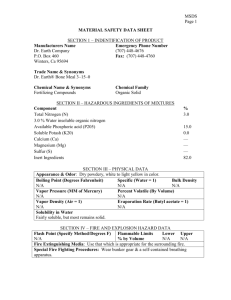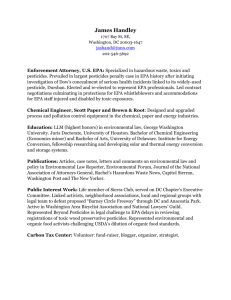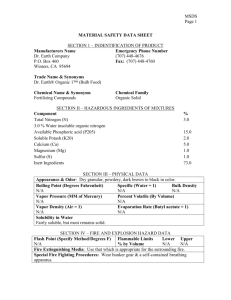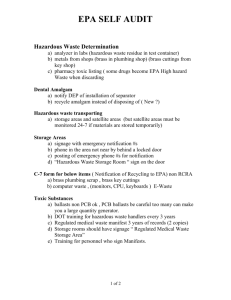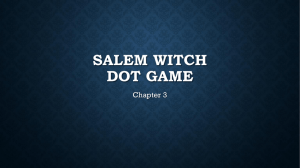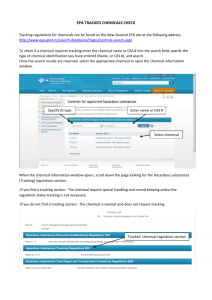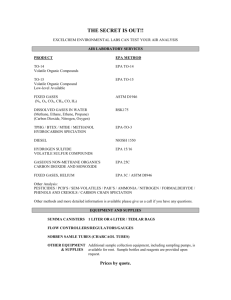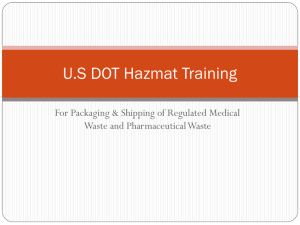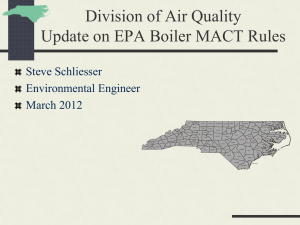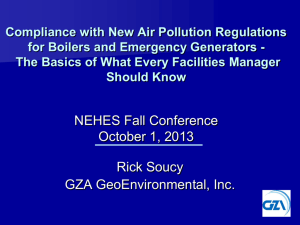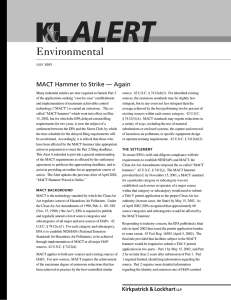July 2011 - aegisenv
advertisement
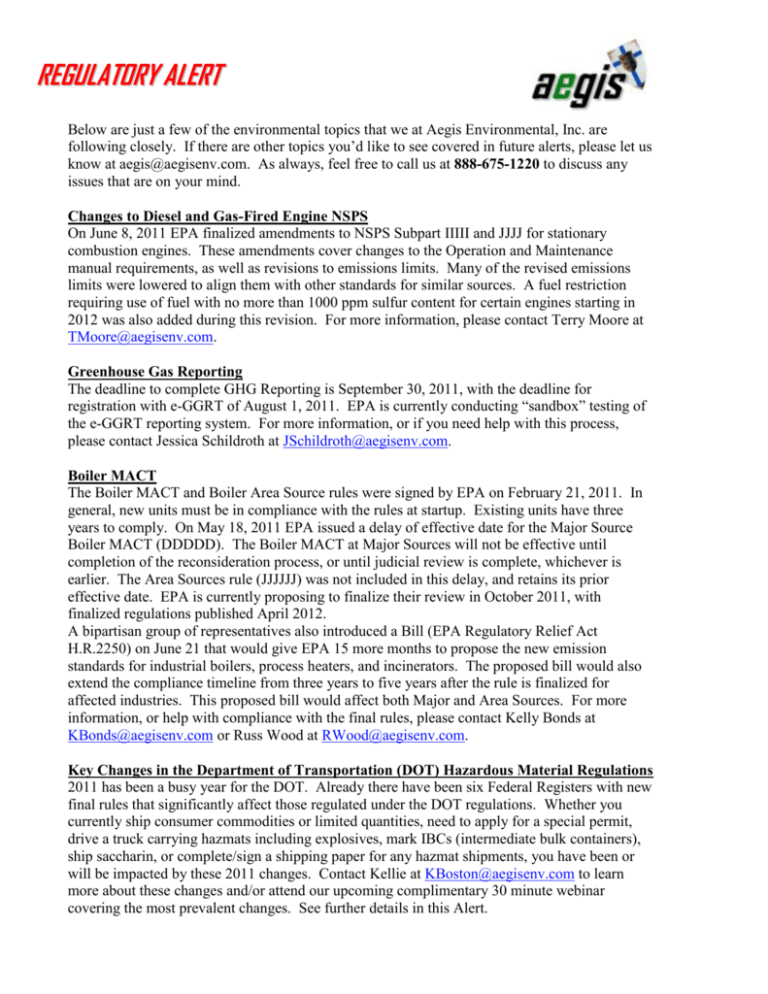
REGULATORY ALERT Below are just a few of the environmental topics that we at Aegis Environmental, Inc. are following closely. If there are other topics you’d like to see covered in future alerts, please let us know at aegis@aegisenv.com. As always, feel free to call us at 888-675-1220 to discuss any issues that are on your mind. Changes to Diesel and Gas-Fired Engine NSPS On June 8, 2011 EPA finalized amendments to NSPS Subpart IIIII and JJJJ for stationary combustion engines. These amendments cover changes to the Operation and Maintenance manual requirements, as well as revisions to emissions limits. Many of the revised emissions limits were lowered to align them with other standards for similar sources. A fuel restriction requiring use of fuel with no more than 1000 ppm sulfur content for certain engines starting in 2012 was also added during this revision. For more information, please contact Terry Moore at TMoore@aegisenv.com. Greenhouse Gas Reporting The deadline to complete GHG Reporting is September 30, 2011, with the deadline for registration with e-GGRT of August 1, 2011. EPA is currently conducting “sandbox” testing of the e-GGRT reporting system. For more information, or if you need help with this process, please contact Jessica Schildroth at JSchildroth@aegisenv.com. Boiler MACT The Boiler MACT and Boiler Area Source rules were signed by EPA on February 21, 2011. In general, new units must be in compliance with the rules at startup. Existing units have three years to comply. On May 18, 2011 EPA issued a delay of effective date for the Major Source Boiler MACT (DDDDD). The Boiler MACT at Major Sources will not be effective until completion of the reconsideration process, or until judicial review is complete, whichever is earlier. The Area Sources rule (JJJJJJ) was not included in this delay, and retains its prior effective date. EPA is currently proposing to finalize their review in October 2011, with finalized regulations published April 2012. A bipartisan group of representatives also introduced a Bill (EPA Regulatory Relief Act H.R.2250) on June 21 that would give EPA 15 more months to propose the new emission standards for industrial boilers, process heaters, and incinerators. The proposed bill would also extend the compliance timeline from three years to five years after the rule is finalized for affected industries. This proposed bill would affect both Major and Area Sources. For more information, or help with compliance with the final rules, please contact Kelly Bonds at KBonds@aegisenv.com or Russ Wood at RWood@aegisenv.com. Key Changes in the Department of Transportation (DOT) Hazardous Material Regulations 2011 has been a busy year for the DOT. Already there have been six Federal Registers with new final rules that significantly affect those regulated under the DOT regulations. Whether you currently ship consumer commodities or limited quantities, need to apply for a special permit, drive a truck carrying hazmats including explosives, mark IBCs (intermediate bulk containers), ship saccharin, or complete/sign a shipping paper for any hazmat shipments, you have been or will be impacted by these 2011 changes. Contact Kellie at KBoston@aegisenv.com to learn more about these changes and/or attend our upcoming complimentary 30 minute webinar covering the most prevalent changes. See further details in this Alert. Public Comment Deadline Extended for Draft Guidance on Identifying Waters Protected by the Clean Water Act EPA and the U.S. Army Corps of Engineers have extended the public comment period by 30 days for the draft guidance on Identifying Waters Protected by the Clean Water Act. The comment period has been extended to July 31, 2011. For more information, please contact Terry Moore at TMoore@aegisenv.com. UST Operators Training Update A revision has been made to 9VAC 25-583, Virginia’s Underground Storage Tank (UST) regulations which now require that Class A, B, and C operators complete a DEQ-approved Operator’s Training Course. This requirement takes effect on August 8, 2012. Aegis is working with key DEQ personnel to be able to offer these custom training courses as soon as DEQ is ready to roll out this program. Three separate courses will be available for each operator level, and some operators may be required to take multiple levels to comply with DEQ’s requirements. For more information, please contact Kellie Boston at KBoston@aegisenv.com. Greenhouse Gas Tailoring Rule As of July 1, 2011, GHG emissions of 100,000 TPY or more at new sources or increases of 75,000 TPY or more at existing sources will trigger PSD permitting even if PSD is not triggered by another pollutant. Title V permitting is also triggered by GHG emissions of 100,000 TPY or more regardless if it’s triggered by another pollutant. If you have a permit application being reviewed by the permitting authority on July 1, you’ll have to incorporate the post July 1 thresholds before your permit can be issued. On June 20th, nine states and 23 industry groups filed briefs arguing that EPA’s tailoring rule violates the Clean Air Act and should be vacated. The briefs stated that it violated the CAA by excluding smaller sources, and that the CAA was intended to regulate local sources of pollution rather than global sources such as GHGs. Please contact Jessica Schildroth at JSchildroth@aegisenv.com or Terry Moore at TMoore@aegisenv.com for more information. Changes to General Permits for Stormwater Discharges A number of NPDES Multi-Sector General Permits for Stormwater Discharges Associated with Industrial Activity have expired or will be expiring in 2011. States with general permits under revision or up for renewal include Texas, California, Oregon, Colorado, Oklahoma, Ohio, Kansas and Georgia. For assistance with stormwater compliance including filing a Notice of Intent, Stormwater Pollution Prevention Plans or training, please contact Donna at DBausch@aegisenv.com or Jennifer at JParrott@aegisenv.com. Complimentary 30-minutes DOT Hazmat Shipper and Transporter Changes Webinar Only take 30 minutes out of your busy schedule to learn the latest DOT Hazmat changes that affect you and your operations. This webinar will highlight the HM215-K Harmonization Regulation focusing on changes to the way you can ship consumer commodities and limited quantities. Learn more about the additional 2011 regulatory changes including the rulings focusing on the new online Special Permit application process, changes for drivers (texting and explosive storage requirements), and enforcement authority procedures. Even though DOT Hazmat training is only required every 3 years, you are required to stay abreast of the regulations. Use this complimentary webinar to keep everyone up to date by clicking here to register for our July 20th webinar at 11am-11:30am. Contact Kellie at KBoston@aegisenv.com for additional information or to schedule your environmental training. Aegis offering DOT Hazardous Material Training in the Richmond, VA office this Fall Do you or your employees need DOT Hazardous Material Training for Shippers? Aegis plans to offer our 2-day course in our Richmond, VA office early this Fall. DOT Hazardous Material Transportation training is required every 3 years. This course will provide familiarity with the general provisions of 49 CFR Parts 171-180, identification of hazardous materials, and knowledge of specific requirements to perform job duties related to shipment of hazardous materials/waste. Course topics also include: security awareness, emergency response, identifying, packaging, marking, labeling, and completion of paperwork for hazardous materials/wastes transported in local and interstate commerce. Our course has been updated with the latest 2011 regulations including the Global Harmonization Requirements and we will be sure to cover some of your site specific materials. Please contact Kellie at KBoston@aegisenv.com if you are interested in this Richmond, VA . If you prefer not to receive future Regulatory Alerts or would like to be added to our Regulatory Alert subscribers, Click Here
